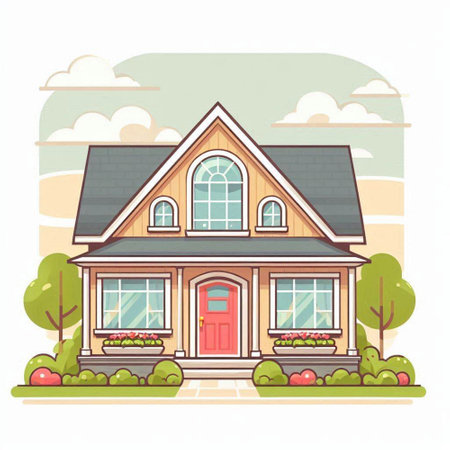Understanding Freehold: An Overview
When you’re looking to buy a home in the UK, one of the first terms you’ll encounter is “freehold.” Understanding what freehold means—and how it differs from other property tenure types like leasehold—is crucial for both buyers and current homeowners. In essence, owning a freehold property gives you outright ownership of both the building and the land it stands on, with no time limit attached. This is considered the most complete form of ownership available in British property law.
To put things into perspective, let’s compare the main types of property tenure found in the UK:
| Tenure Type | Ownership of Land | Ownership of Building | Time Limit | Common Usage |
|---|---|---|---|---|
| Freehold | You own the land | You own the building | No time limit—ownership is indefinite | Most houses |
| Leasehold | Land owned by freeholder (landlord) | You own the right to occupy/building for set period | Usually 99–999 years, but can be less | Mainly flats/apartments, some houses |
| Commonhold | You own your unit & share ownership of common areas with other owners | Your individual flat/unit & shared spaces jointly owned with others | No time limit—perpetual ownership as long as commonhold exists | Certain blocks of flats, rare compared to leasehold/freehold |
This clear distinction between freehold, leasehold, and commonhold has a direct impact on your rights, responsibilities, and long-term security as a homeowner or prospective buyer. For those seeking maximum control and peace of mind over their property and future plans, freehold remains the gold standard within the UK market.
2. Key Legal Rights and Responsibilities
Owning a freehold property in the UK means you have outright ownership of both the building and the land it stands on, indefinitely. This status brings with it several important legal rights and responsibilities that home buyers and owners must be aware of. Understanding these implications ensures compliance with UK property law, protects your investment, and helps maintain the property’s long-term value.
Legal Implications for Freehold Owners
When you purchase a freehold, you become solely responsible for the upkeep and maintenance of your home and the land within its boundaries. Unlike leaseholders, freeholders are not subject to ground rent or service charges imposed by a landlord; however, this independence comes with statutory obligations.
Main Rights of Freehold Owners
| Right | Description |
|---|---|
| Full Ownership | You own the property and land outright, with no time limit. |
| Freedom to Alter | You can renovate, extend, or alter your property (subject to planning permission and building regulations). |
| Control Over Land Use | You decide how to use your land within local council guidelines. |
Main Responsibilities of Freehold Owners
| Responsibility | Details |
|---|---|
| Property Maintenance | You must repair and maintain the structure (roof, walls, windows) as well as any gardens or outbuildings. |
| Statutory Obligations | You are required to comply with all relevant UK laws, including planning permissions, building regulations, and health & safety standards. |
| Insurance Requirements | You need to arrange adequate buildings insurance for your freehold property. |
| Council Tax and Utilities | You are liable for paying council tax and utility bills directly. |
Key Takeaway for UK Home Buyers and Owners:
Freehold ownership gives you autonomy but also makes you fully accountable for your property’s condition and compliance with legislation. Regular maintenance is not just good practice; it’s a legal expectation that protects both your asset’s value and your standing as a responsible property owner.

3. Implications for Home Buyers
Understanding the implications of buying a freehold property is essential for anyone considering home ownership in the UK. Freehold status directly impacts the purchasing process, mortgage arrangements, and long-term responsibilities. Below, we explore how these factors come into play for prospective buyers.
Mortgage Considerations
Lenders in the UK often view freehold properties as more secure collateral compared to leaseholds. This is largely because freeholders own both the building and the land it stands on, reducing legal complexities around ownership. As a result, securing a mortgage for a freehold home is usually more straightforward, and buyers may find a wider range of lending options available.
Potential Benefits and Drawbacks
| Benefit | Drawback |
|---|---|
| No ground rent or service charges to pay, offering predictable costs over time. | Full responsibility for all repairs and maintenance, including structural elements and external areas. |
| Complete autonomy over property modifications (subject to planning permission). | Higher upfront purchase price compared to comparable leasehold properties. |
| No risk of lease expiry affecting property value or saleability. | Potentially higher insurance costs due to full liability for the building and land. |
Decision-Making Factors for Buyers
When weighing up whether to purchase a freehold property, buyers should consider their willingness to take on ongoing maintenance and repair obligations versus the financial predictability and security that comes with outright ownership. It’s also important to factor in local market conditions—freehold homes are generally preferred across much of England and Wales, but may be less common in certain urban developments. Consulting with an experienced conveyancer or surveyor can help clarify any unique considerations specific to individual properties.
4. Freehold and Property Maintenance
When you purchase a freehold property in the UK, you assume full responsibility for both the building and the land it stands on. Unlike leasehold arrangements, where landlords or management companies often oversee major repairs and communal areas, freeholders are solely accountable for all aspects of property upkeep. This autonomy brings freedom but also significant obligations, particularly when it comes to maintaining your home’s structure and value.
Key Maintenance Responsibilities for Freeholders
| Maintenance Area | Description | Typical Tasks |
|---|---|---|
| Structural Integrity | Ensuring the building remains sound and safe over time. | Roof repairs, foundation checks, external wall upkeep. |
| Repairs & Upkeep | Addressing wear and tear as well as unexpected damage. | Guttering, plumbing, electrics, windows, doors. |
| Grounds & Boundaries | Caring for gardens, driveways, fences, and outbuildings. | Lawn mowing, hedge trimming, fence repairs. |
| Legal Compliance | Meeting UK regulations regarding safety and standards. | Gas safety checks, electrical certificates, planning permissions. |
The Practical Implications for Homeowners
As a freeholder, you must budget for ongoing maintenance costs—there is no service charge or managing agent to rely on. Regular inspections can help spot issues early before they become costly repairs. Many UK homeowners choose to schedule annual checks for roofing, heating systems (such as boiler servicing), and external paintwork to protect against damp and weathering. Additionally, any major renovations or extensions require navigating local planning laws yourself. In essence, freehold ownership provides complete control but demands vigilance and proactive care to preserve your investment.
5. Selling a Freehold Home: What to Know
Selling a freehold property in the UK comes with its own set of considerations and advantages. Understanding these factors will help you achieve a smooth transaction and potentially enhance your home’s market appeal.
Key Advantages of Selling Freehold
Freehold homes are often more attractive to buyers than leasehold properties. This is because the new owner will have outright ownership of both the building and the land, without concerns over diminishing lease terms or ground rent charges. Such features can boost your property’s value and desirability on the open market.
Market Appeal: Freehold vs Leasehold
| Aspect | Freehold | Leasehold |
|---|---|---|
| Ownership | Full (land & building) | Limited (building only) |
| Ground Rent/Service Charges | No ground rent; service charges rare | Often required |
| Long-term Value | Tends to retain value better | May decrease as lease shortens |
| Ease of Sale | Generally easier to sell | Can be more complicated |
Essential Steps in Selling a Freehold Property
- Legal Documentation: Ensure that all title deeds, planning permissions, and compliance certificates are up-to-date and accessible.
- Property Valuation: Obtain a professional valuation to set a realistic asking price reflecting your freehold status.
- Marketing: Highlight the benefits of freehold ownership in your listing—such as no lease restrictions or ground rent—to attract more buyers.
- Conveyancing: Choose an experienced solicitor familiar with freehold transactions to handle contracts, local authority searches, and completion efficiently.
- Disclosure: Be transparent about any issues affecting the property, such as boundaries or planning history, to avoid delays later on.
Selling Timeline Overview
| Step | Description |
|---|---|
| Preparation | Gather documents, arrange valuation, instruct an estate agent/solicitor |
| Marketing & Viewings | Create compelling listings and conduct viewings highlighting freehold benefits |
| Offer & Negotiation | Negotiate terms and accept the best offer |
| Conveyancing & Contracts | Your solicitor manages legal processes through to exchange of contracts |
| Completion & Handover | The sale is finalised, and keys are handed over to the buyer |
Cultural Tips for UK Sellers
Punctuality and transparency are highly valued in UK property transactions. Respond promptly to enquiries from potential buyers and solicitors. Be prepared for negotiations on price and minor repairs—these are common practices during the selling process.
Summary Advice:
If you own a freehold home, leverage its appeal by being well-prepared legally, setting a competitive price, and communicating clearly throughout the process. A well-managed sale not only ensures compliance with UK standards but also helps secure the best possible outcome for both seller and buyer.
6. Common Myths and FAQs
Understanding freehold can be confusing, especially with so many myths circulating among UK home buyers and owners. Here, we address some of the most frequent misconceptions and answer common questions to help you make informed decisions about freehold properties.
Myth vs Reality: Clearing Up Freehold Misconceptions
| Myth | Reality |
|---|---|
| You don’t pay any charges as a freeholder. | While you won’t pay ground rent, you may still have to contribute towards communal maintenance if your property is part of an estate or development. |
| Freehold means you can do anything you want to your property. | You generally have more freedom, but must still comply with planning permission, building regulations, and possible restrictive covenants. |
| All houses in the UK are sold as freehold. | Most houses are freehold, but some—especially new builds or shared ownership—may be leasehold, so always check the tenure before buying. |
| Once you own the freehold, there are no further costs involved. | You’re responsible for ongoing maintenance, insurance, and any necessary repairs—costs that can add up over time. |
Frequently Asked Questions About Freehold Properties
Do I have to pay service charges as a freeholder?
If your home is within a private estate or shares communal spaces (like gardens or car parks), you might need to contribute towards their upkeep through estate charges, even as a freeholder.
Can I extend or alter my freehold house freely?
Significant changes often require planning permission from your local council. Also, check for restrictive covenants on your title deeds that could limit certain alterations or uses of your property.
If I buy a freehold property, do I own the land outright?
Yes, owning the freehold means you own both the property and the land it stands on indefinitely, subject only to laws and local authority regulations.
Are flats ever sold as freehold?
It’s very rare. Most flats are leasehold because multiple owners share responsibility for the building structure and communal areas. However, in some cases, flat owners collectively purchase the freehold (a process called enfranchisement) and manage it jointly through a company.
Still Unsure?
If you’re uncertain about any aspect of freehold ownership, consult with a solicitor or conveyancer experienced in UK property law—they can review specific documents and clarify your rights and responsibilities before you commit to a purchase.


